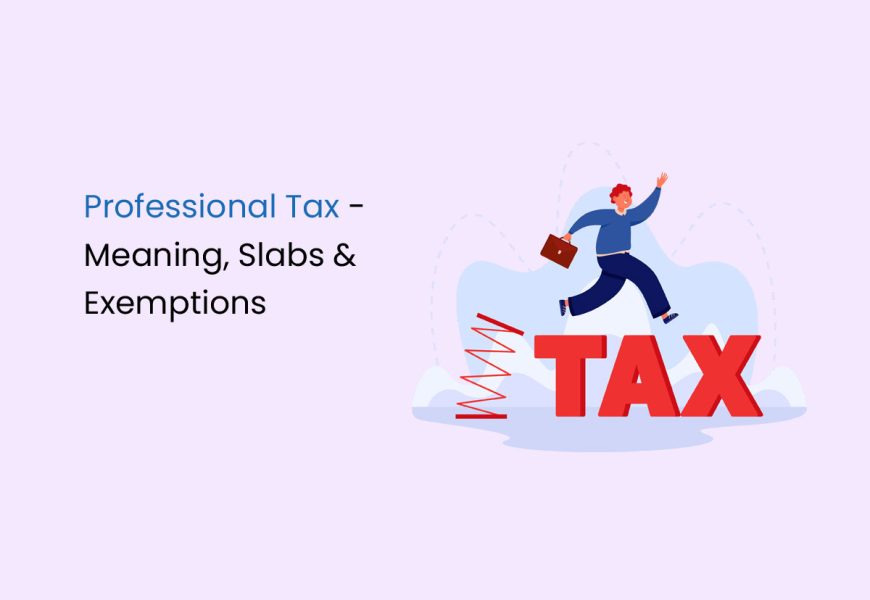If you go through all your payslips, you will notice the reduction with the name Professional Tax. The state you live in is responsible for this deduction. This deduction takes place along with deductions for TDS, EPF and ESI.
Professional Tax is a direct tax. It is levied and collected by the state governments in India. Not all states charge this tax. The calculation and amount differs from state to state, but it has a limit of Rs. 2500 per year.
What is Professional Tax (PT)?
Professional Tax is a direct tax on salaried employees, professionals, and traders by the state government. This is a tax paid by every single earning individual. Only some state governments collect this tax. The limit of the tax is set at Rs. 2,500 per year.
In the case of employees, this tax is collected by their employers to submit to the state. At the same time, professionals pay the tax directly to the state government.
Professional Taxpayers
The following individuals are liable to pay Professional Tax:
- Salaried employees or wage workers
- Members of HUFs (Hindu Undivided Families)
- Professionals (Doctors, Lawyers, Engineers, Architects, Accountants, etc.)
- Companies, Firms, LLPs, Corporations, Societies, Associations, Clubs
Who Pays Professional Taxes?
When it comes to employees, the employer is responsible for the deduction and payment of the Professional Tax. They must register for the Professional Tax Enrolment Certificate and the Professional Tax Registration Certificate with the Commercial Tax Department to deduct it from their employee’s salaries.
Professionals not working with an employer can register according to the income slabs made by their state legislature.
Who collects Professional Tax?
The Commercial Tax Department collects and delivers the Professional Tax to the state government after collecting it from employers and professionals. Failing to deliver the Professional Tax to the state government can mean having penalties imposed on the Commercial Tax Department for not collecting or failing to pay the professional tax.
How do you fill in the Professional Tax Application form?
The steps to fill out the professional tax application form are as follows:
- Visit the official website of Professional Tax (for the relevant state)
- Click on ‘Enrolment Application’ on the left side of the page
- Select ‘New’ if you are paying professional tax for the first time
- Select ‘Enrolled’, if you have filed tax returns earlier
- Enter the required details
- Make the payment through a credit/debit card or net banking
- Download the receipt after payment.
States collecting Professional Tax
The states that collect Professional Tax are as follows:
- Jharkhand
- West Bengal
- Odisha
- Bihar
- Madhya Pradesh
- Assam
- Tripura
- Nagaland
- Meghalaya
- Sikkim
- Manipur
- Mizoram
- Andhra Pradesh
- Chhattisgarh
- Tamil Nadu
- Kerala
- Maharashtra
- Telangana
- Karnataka
Professional Tax Slabs
| State | Period of deduction | Income Slabs | Tax Amount |
|---|---|---|---|
| Andhra Pradesh | Monthly | Up – 15,000 | Nil |
| Rs. 15,001 – 20,000 | Rs 150 | ||
| More than 20,000 | Rs. 200 | ||
| Assam | Monthly | Up – 10,000 | Nil |
| Rs. 10,001 – 15,000 | Rs. 150 | ||
| Rs. 15,001 – 25,000 | Rs. 180 | ||
| More than Rs. 25,000 | Rs. 208 | ||
| Bihar | Yearly | Up to 3 lakhs | Nil |
| Rs. 3 lakhs – 5 lakhs | Rs. 1,000 | ||
| Rs. 5 lakhs – 10 lakhs | Rs. 2,000 | ||
| Above Rs. 10 lakhs | Rs. 2,500 | ||
| Jharkhand | Yearly | Up to 3 lakhs | Nil |
| Rs. 3 lakhs – 5 lakhs | Rs. 1,200 | ||
| Rs. 5 lakhs – 8 lakhs | Rs. 1,800 | ||
| Rs. 8 lakhs – 10 lakhs | Rs. 2,100 | ||
| Above Rs. 10 lakhs | Rs. 2,500 | ||
| Gujarat | Monthly | Up – 5999 | Nil |
| Rs. 6000 – 8999 | Rs. 80 | ||
| Rs. 9000 – 11999 | Rs. 150 | ||
| More than Rs. 12000 | Rs. 200 | ||
| Karnataka | Monthly | Up – 15,000 | Nil |
| Above Rs. 15,000 | Rs. 200 | ||
| Kerala | Half-yearly | Up to 11,999 | Nil |
| Rs. 12,000 – 17,999 | Rs. 120 | ||
| Rs. 18,000 – 29,999 | Rs. 180 | ||
| Rs. 30,000 – 44,999 | Rs. 300 | ||
| Rs. 45,000 – 59,999 | Rs. 450 | ||
| Rs. 60,000 – 74,999 | Rs. 600 | ||
| Rs. 75,000 – 99,999 | Rs. 750 | ||
| Rs. 1,00,000 – 1,24,999 | Rs. 1,000 | ||
| Above Rs. 1,25,000 | Rs. 1,250 | ||
| Madhya Pradesh | Monthly | Up to 2,25,000 | Nil |
| Rs. 2,25,001 – 3,00,000 | Rs. 1,500 (Rs. 125 per month) | ||
| Rs. 3,00,000 – 4,00,000 | Rs. 2,000 (Rs. 166 per month For 11 Months and Rs. 174 For 12th month) | ||
| Above Rs. 4,00,001 | Rs. 2,500 (Rs. 208 per month For 11 months and Rs. 212 for 12th month) | ||
| Maharashtra | Monthly | Up to 7,500 | Nil |
| Rs 7,501 – 10,000 | Rs. 175 (Nil for women) | ||
| Above Rs. 10,000 | Rs. 200 | ||
| Rs. 300 (In February only) | |||
| Manipur | Yearly | Up to 50,000 | Nil |
| Rs. 50,000 – 75,000 | Rs. 1,200 | ||
| Rs. 75,000 – 1,00,000 | Rs. 2,000 | ||
| Rs. 1,00,000 – 1,25,000 | Rs. 2,400 | ||
| Above Rs. 1,25,000 | Rs. 2,500 | ||
| Meghalaya | Yearly | Up to 50,000 | Nil |
| Rs. 50,001 – 75,000 | Rs. 200 | ||
| Rs. 75,001 – 1,00,000 | Rs. 300 | ||
| Rs. 1,00,001 – 1,50,000 | Rs. 500 | ||
| Rs. 1,50,001 – 2,00,000 | Rs. 750 | ||
| Rs. 2,00,001 – 2,50,000 | Rs. 1,000 | ||
| Rs. 2,50,001 – 3,00,000 | Rs. 1,250 | ||
| Rs. 3,00,001 – 3,50,000 | Rs. 1,500 | ||
| Rs. 3,50,001 – 4,00,000 | Rs. 1,800 | ||
| Rs. 4,00,001 – 4,50,000 | Rs. 2,100 | ||
| Rs. 4,50,001 – 5,00,000 | Rs. 2,400 | ||
| Above Rs. 5,00,001 | Rs. 2,500 | ||
| Mizoram | Monthly | Up – 5,000 | Nil |
| Rs. 5,001 – 8,000 | Rs. 75 (Assessee may pay in lump sum Rs. 900 p.a.) | ||
| Rs. 8,001 – 10,000 | Rs. 120 (Assessee may pay in lump sum Rs. 1440 p.a.) | ||
| Rs. 10,001 – 12,000 | Rs. 150 (Assessee may pay in lump sum Rs. 1800 p.a.) | ||
| Rs. 12,001 – 15,000 | Rs. 180 (Assessee may pay in lump sum Rs. 2160 p.a.) | ||
| Above Rs. 15,001 | Rs. 208 (Assessee may pay in lump sum Rs 2500 p.a.) | ||
| Nagaland | Monthly | Up – 4,000 | Nil |
| Rs. 4,001 – 5,000 | Rs. 35 | ||
| Rs. 5,001 – 7,000 | Rs. 75 | ||
| Rs. 7,001 – 9,000 | Rs. 110 | ||
| Rs. 9,001 – 12,000 | Rs. 180 | ||
| Above Rs. 12,001 | Rs. 208 | ||
| Odisha | Yearly | Up – 1,60,000 | Nil |
| Rs. 1,60,001 – 3,00,000 | Rs. 1,500 | ||
| Above Rs. 3,00,001 | Rs. 2,500 | ||
| Puducherry | Yearly | Up to 99,999 | Nil |
| Rs. 1,00,000 – 2,00,000 | Rs. 250 | ||
| Rs. 2,00,001 – 3,00,000 | Rs. 500 | ||
| Rs. 3,00,001 – 4,00,000 | Rs. 750 | ||
| Rs. 4,00,001 – 5,00,000 | Rs. 1,000 | ||
| Above Rs. 5,00,001 | Rs. 1,250 | ||
| Punjab | Monthly | Above Rs. 2,50,000 | Rs. 200 |
| Sikkim | Monthly | Up – 20,000 | Nil |
| Rs. 20,001 – 30,000 | Rs. 125 | ||
| Rs. 30,001 – 40,000 | Rs. 150 | ||
| Above Rs. 40,000 | Rs. 200 | ||
| Tamil Nadu | Monthly | Up to 21,000 | Nil |
| Rs. 21,001 – 30,000 | Rs. 135 | ||
| Rs. 30,000 – 45,000 | Rs. 315 | ||
| Rs. 45,001 – 60,000 | Rs. 690 | ||
| Rs. 60,001 – 75,000 | Rs. 1,025 | ||
| Above Rs. 75,000 | Rs. 1,250 | ||
| Telangana | Monthly | Up to 15,000 | Nil |
| Rs. 15,001 – 20,000 | Rs. 150 | ||
| Above Rs. 20,001 | Rs. 200 | ||
| Tripura | Yearly | Up to Rs. 7,500 | Nil |
| Rs. 7,501 – 15,000 | Rs. 1,800 | ||
| Above Rs. 15,001 | Rs. 2,496 | ||
| West Bengal | Monthly | Up to 10,000 | Nil |
| Rs. 10,001 – 15,000 | Rs. 110 | ||
| Rs. 15,001 – 25,000 | Rs. 130 | ||
| Rs. 25,001 – 40,000 | Rs. 150 | ||
| Above Rs. 40,000 | Rs. 200 |
States not collecting Professional Tax
The states that do not collect Professional Tax are as follows:
- Himachal Pradesh
- Uttar Pradesh
- Arunachal Pradesh
- Chandigarh
- Jammu & Kashmir
- Uttarakhand
- Delhi
- Haryana
- Punjab
- Rajasthan
- Goa
- Daman & Diu
- Dadra & Nagar Haveli
- Andaman & Nicobar Islands
- Lakshadweep
Exemptions in Professional Tax
The individuals exempt from paying professional tax are as follows:
- Parents or guardians of children with a mental or physical disability.
- Any disabled individual with at least a 40% disability, after submitting the relevant certificate.
- Deaf, blind, and dumb individuals who are earning a salary.
- An individual who has one child and has undergone a sterilizing operation, after submitting the relevant documents.
- Any individual above the age of 65 years.
- Members of the forces as defined in the Air Force Act of 1950, the Army Act of 1950 and the Navy Act of 1957. This includes auxiliary forces members or reservists serving in the state
- Temporary workers in the textile industry.
- Women exclusively engaged as agents under the Mahila Pradhan Kshetriya Bachat Yojana.
- Individuals who have educational institutions that teach classes up to twelfth standard.
- All philanthropic and charitable hospitals are present in places that come below the taluk level.
- Individuals with a permit for a single three-wheeler or a taxi to carry goods.
Consequences of Professional Tax Regulation Violation
While the actual penalty or penal interest for Professional Tax registration violation depends on state legislation, all states can levy a penalty for not registering once professional tax legislation becomes applicable. Failing to make payments within the due date is penalised.
For example, the liability for late registration in Maharashtra is at Rs 5 per day. A monthly interest of 1.25% is also levied for late payment, along with a 10% penalty on the tax amount for non-payment/delay of professional tax, and a fine of Rs.1,000-2,000 for late return submission.
Conclusion
Employers and professionals must comply with professional tax regulations. Professional tax is a significant revenue source for state governments. Therefore, professionals and businesses should stay updated on legislative developments and seek professional advice when necessary.
In the ever-changing world of taxation, knowledge is power. Individuals and businesses can achieve financial health by embracing a proactive approach to professional tax management. Remember, compliance isn’t simply a legal requirement but a key element in building a financially secure and stable future.
We at TankhaPay help you ensure that all your registration and payments for Professional tax are taken care of. We also help you manage tasks such as salary calculations, tax deductions and compliance reporting, offering efficiency and accuracy in payroll management.
To learn more about our payrolling services, download our app, available in the Android and iOS app stores.
FAQs on Professional Tax
Is there any Professional Tax for Union Territories?
Unlike Income Tax, which the central government charges, the state government levies Professional Tax. As the central government administers the Union Territories, they are exempt from paying professional taxes.
What should I do if I have queries related to my Professional Tax?
In case of questions, you can contact the control room of the Commercial Taxes Department, which operates 24/7, by calling any of the numbers: 080-22208401/080-22342689/080-22252258.
Do I need to pay Professional Tax if I am a freelance professional?
If you are a freelance professional, you still need to pay professional tax, as this applies to all professionals.
Is Professional Tax paid monthly or yearly?
Each state declares an income slab, and Professional Tax is deducted based on these slabs. Hence, it tends to differ from state to state. However, a few states and union territories in India do not charge Professional Tax. Professional Tax is paid by dividing the annual amount due into 12 equal instalments to be paid monthly. February is an exception, as the tax is higher than other months.
Can we claim Professional Tax?
The refund of excess tax payment can be claimed by you during a financial year by filing the income tax returns for that year. According to the Income Tax Act, you must file the return in the related assessment year, latest by July 31 (unless the deadline is extended), to get the refund.
What is the difference between Professional Tax and Income Tax?
Professional Tax is paid to the state government, while Income Tax is paid to the central government.





















